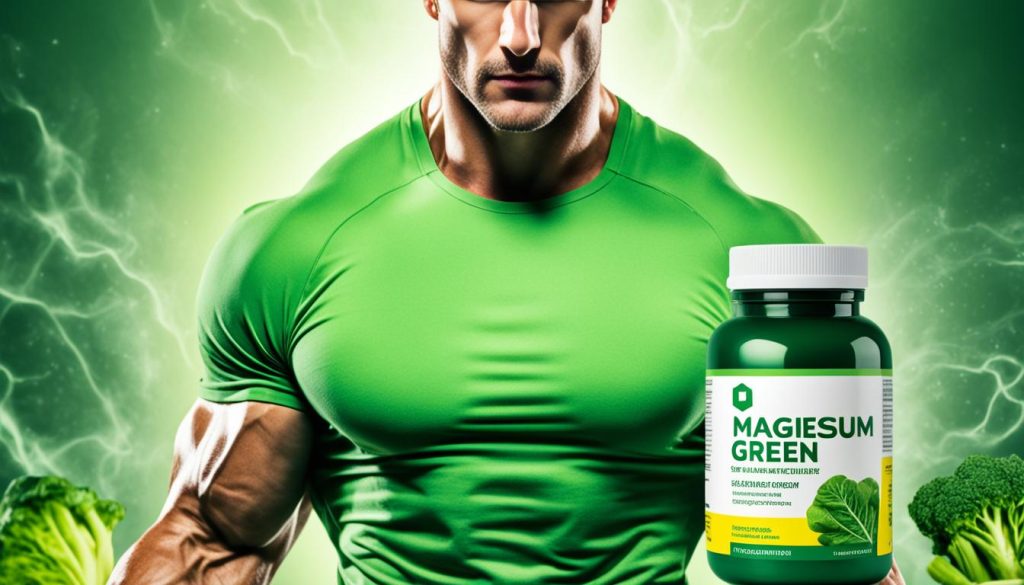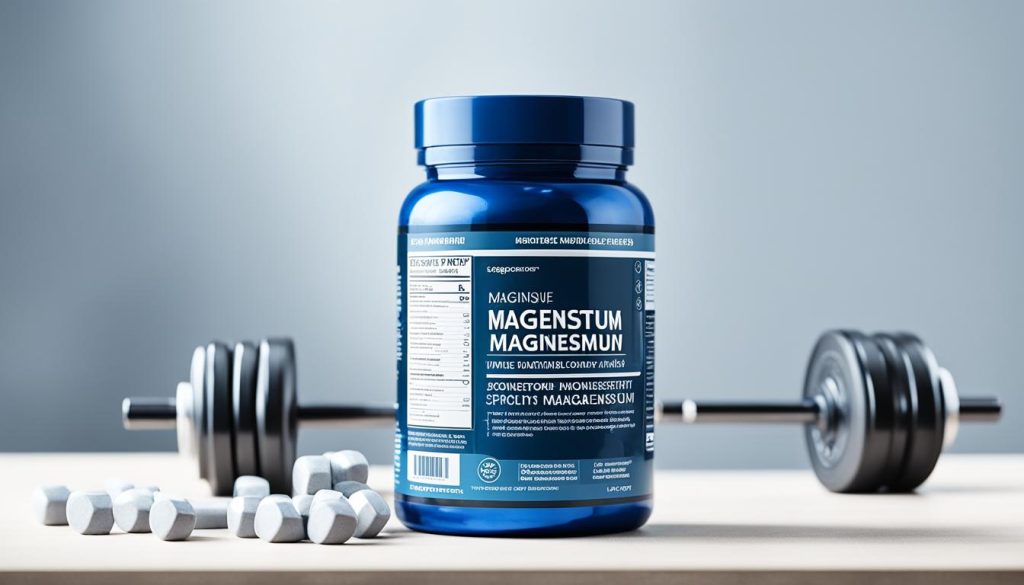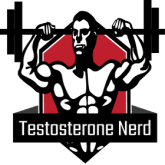Did you know that magnesium can play a crucial role in boosting testosterone levels in the body? While testosterone is often associated with male characteristics and muscle growth, few people realize the significant impact that magnesium has on its production. In this article, we will delve into the importance of magnesium for hormone balance and explore how it enhances testosterone levels in the body. Get ready to discover the surprising benefits of this essential mineral!
Key Takeaways:
- Magnesium plays a crucial role in boosting testosterone levels.
- Magnesium is essential for hormone balance in the body.
- Studies have shown that magnesium supplementation can enhance testosterone production.
- Incorporating magnesium-rich foods into your diet can support testosterone levels.
- Addressing magnesium deficiency can help combat low testosterone.
Understanding Magnesium: A Crucial Mineral for Testosterone Enhancement
In this section, we will delve into the fundamental role that magnesium plays in enhancing testosterone levels. We will explore what magnesium is and why it holds immense importance for hormone balance in the body. Additionally, we will discuss how magnesium interacts with hormones and its profound impact on testosterone production. Furthermore, we will uncover the significance of including magnesium-rich foods in our diet to maintain optimal hormonal health.
What is Magnesium and Why is it Important?
Magnesium is a vital mineral that performs various essential functions in the body. It is involved in over 300 enzymatic reactions, including those related to energy production, protein synthesis, and muscle and nerve function. Magnesium plays a crucial role in maintaining a healthy cardiovascular system, bone density, and neurological health. Moreover, it is known to support optimal hormone balance, including testosterone production.
Magnesium is a critical mineral for testosterone enhancement due to its involvement in hormone synthesis, regulation, and metabolism. It facilitates the conversion of cholesterol into pregnenolone, a precursor hormone for testosterone synthesis. Furthermore, magnesium supports the function of enzymes responsible for converting pregnenolone to testosterone. Thus, inadequate magnesium levels can significantly impact testosterone production, leading to hormonal imbalances.
How Magnesium Interacts with Hormones in the Body
Magnesium interacts with hormones in various ways to maintain hormonal balance and optimize testosterone levels.
Magnesium deficiency can diminish the activity of enzymes involved in the synthesis and metabolism of testosterone, leading to reduced testosterone levels.
* Insulin-like Growth Factor 1 (IGF-1): Magnesium promotes the release and activity of IGF-1, a hormone that stimulates testosterone production. IGF-1 plays a critical role in muscle growth and overall well-being.
* Sex Hormone-Binding Globulin (SHBG): Magnesium affects the production and bioavailability of SHBG, a protein that binds to sex hormones such as testosterone. Optimal magnesium levels help maintain an appropriate balance of free and bound testosterone in the body.
* Cortisol: Adequate magnesium levels can help regulate cortisol, a stress hormone that can inhibit testosterone production. By managing cortisol levels, magnesium helps maintain optimal testosterone levels.
Magnesium-Rich Foods and Their Impact on Hormonal Health
Consuming magnesium-rich foods plays a crucial role in maintaining hormonal health and enhancing testosterone levels. Incorporating these foods into your diet can provide abundant amounts of magnesium, supporting optimal testosterone production. Some of the best sources of dietary magnesium include:
| Food | Magnesium Content per 100g |
|---|---|
| Spinach | 79mg |
| Pumpkin Seeds | 262mg |
| Almonds | 268mg |
| Dark Chocolate (70-85% cocoa) | 327mg |
| Avocado | 29mg |
These magnesium-rich foods not only boost your magnesium levels but also provide additional nutrients essential for hormone regulation and overall well-being. Including a variety of these foods in your diet can help optimize testosterone levels and support healthy hormonal function.
As we have seen, magnesium plays a critical role in enhancing testosterone levels and maintaining optimal hormone balance. Understanding the importance of magnesium and incorporating it into our diet through magnesium-rich foods can help us naturally boost our testosterone levels and optimize our overall well-being.
The Role of Magnesium in Boosting Testosterone
Magnesium plays a vital role in enhancing testosterone levels in the body. This essential mineral is involved in various biochemical processes that support the production and regulation of testosterone, the primary male sex hormone. Understanding the science behind magnesium’s testosterone enhancing capabilities and the evidence from studies can provide valuable insights into the significance of magnesium in hormone regulation.
The Science Behind Magnesium’s Testosterone Enhancing Capabilities
Magnesium acts as a cofactor in the enzymatic reactions involved in testosterone synthesis. It plays a crucial role in converting cholesterol into pregnenolone, a precursor to testosterone. Additionally, magnesium enhances the activity of enzymes responsible for converting testosterone into its active form, dihydrotestosterone (DHT). This conversion is essential for the optimal function of testosterone in various tissues and organs throughout the body.
Furthermore, magnesium helps maintain healthy levels of sex hormone-binding globulin (SHBG), a protein that binds to testosterone and regulates its bioavailability. Adequate magnesium levels ensure a balance between bound and free testosterone, which is essential for the optimal functioning of this hormone.
Studies on Magnesium and Its Effects on Testosterone Levels
Several studies have investigated the impact of magnesium supplementation on testosterone levels. A study conducted on athletes found that magnesium supplementation resulted in a significant increase in both total and free testosterone levels. Another study involving older men showed that magnesium supplementation improved testosterone levels and increased muscle strength.
In addition to supplementation, consuming magnesium-rich foods has also been shown to support healthy testosterone levels. Foods like dark chocolate, nuts, seeds, leafy green vegetables, and whole grains are excellent sources of magnesium that can help optimize testosterone production.

| Study | Participants | Results |
|---|---|---|
| Study 1 | Athletes | Significant increase in total and free testosterone levels with magnesium supplementation |
| Study 2 | Older men | Improved testosterone levels and increased muscle strength with magnesium supplementation |
These studies provide empirical evidence supporting the role of magnesium in testosterone enhancement. By incorporating magnesium supplementation or increasing the intake of magnesium-rich foods, individuals can optimize their testosterone levels and support overall hormonal balance.
In conclusion, magnesium plays a crucial role in boosting testosterone levels through its involvement in testosterone synthesis, regulation, and bioavailability. Scientific studies have demonstrated the positive effects of magnesium supplementation on testosterone levels. By ensuring an adequate intake of magnesium through supplementation or dietary choices, individuals can support healthy testosterone production and maintain optimal hormonal balance.
Optimizing Testosterone with Magnesium Supplementation
Incorporating magnesium supplementation into your routine can greatly enhance testosterone levels and support overall hormone balance. By following best practices for magnesium supplementation and understanding the different forms of magnesium supplements available, you can optimize your testosterone production and achieve optimal health.
Best Practices for Magnesium Supplementation
When it comes to magnesium supplementation, it is important to follow these best practices to ensure maximum effectiveness:
- Consult with a healthcare professional: Before starting any supplementation regimen, it is always recommended to consult with a healthcare professional to determine the appropriate dosage and form of magnesium for your specific needs.
- Choose high-quality supplements: Look for reputable brands that offer magnesium supplements that are third-party tested for purity and quality.
- Take magnesium with meals: Consuming magnesium supplements with meals can enhance absorption and minimize the risk of gastrointestinal side effects.
- Start with a low dose: It is advisable to start with a low dose of magnesium and gradually increase it as needed, monitoring how your body responds.
- Consistency is key: To experience the full benefits of magnesium supplementation, it is important to take it consistently as part of your daily routine.
Comparing Different Forms of Magnesium Supplements
There are various forms of magnesium supplements available, each with its own characteristics and benefits. Here’s a comparison of common forms:
| Magnesium Supplement | Benefits | Recommended Use |
|---|---|---|
| Magnesium Citrate | Highly bioavailable and easily absorbed | Recommended for individuals with digestive issues or constipation |
| Magnesium Glycinate | Gentle on the stomach and less likely to cause digestive upset | Ideal for individuals with sensitive stomachs |
| Magnesium Oxide | High magnesium content per serving | May be suitable for individuals with low magnesium levels |
It is essential to consider your specific needs and consult with a healthcare professional to determine which form of magnesium supplement is best for you.

As with any supplementation, it is important to remember that magnesium supplements should be complemented with a balanced diet rich in magnesium-rich foods and a healthy lifestyle. Additionally, regular monitoring of your testosterone levels and consulting with a healthcare professional are recommended to ensure optimal results.
By following best practices for magnesium supplementation and choosing the right form of magnesium supplement, you can effectively optimize your testosterone levels and enjoy the numerous benefits of this essential mineral.
Exercise and Magnesium: A Symbiotic Relationship for Testosterone
In addition to its role in testosterone regulation, magnesium also plays a vital role in the connection between exercise and testosterone levels. Understanding how exercise influences magnesium absorption and utilization in the body, as well as the impact of magnesium consumption during workouts, can help maximize testosterone production and optimize overall hormone balance.
How Exercise Influences Magnesium Absorption and Testosterone
Engaging in regular exercise has been shown to increase magnesium absorption in the body. When we exercise, our muscles are put under stress, leading to increased magnesium uptake in these tissues. Magnesium is then transported to the cells responsible for testosterone production, promoting the synthesis of this crucial hormone. The relationship between exercise, magnesium, and testosterone is reciprocal, as magnesium aids in muscle development and strength, while testosterone enhances exercise performance and recovery.
Maximizing Testosterone with Magnesium Consumption During Workouts
To further optimize testosterone levels, it’s essential to consume magnesium-rich foods or supplements during and after workouts. Magnesium helps support muscle function, reduce inflammation, and enhance recovery, all of which directly influence testosterone production. By incorporating magnesium consumption into our fitness routine, we can maximize the benefits of exercise on testosterone and overall hormonal health.
| Exercise Tips for Optimizing Testosterone with Magnesium | Key Takeaways |
|---|---|
| 1. Engage in resistance training | – Exercise promotes magnesium absorption |
| 2. Consume magnesium-rich foods before and after workouts | – Magnesium aids in testosterone synthesis and muscle recovery |
| 3. Consider magnesium supplementation if needed | – Ensure optimal magnesium levels for hormone balance |
| 4. Stay hydrated during exercise | – Proper hydration supports magnesium absorption |
| 5. Incorporate rest and recovery into your routine | – Rest is essential for testosterone production and overall wellness |
By adopting these exercise tips and incorporating magnesium consumption into our workouts, we can create a symbiotic relationship that maximizes testosterone production and hormone balance.
Magnesium’s Benefits Beyond Testosterone: Holistic Health Effects
In addition to its role in boosting testosterone, magnesium offers a wide range of holistic health benefits that extend beyond just hormone regulation. Magnesium plays a key role in maintaining a hormonal balance, not only for testosterone but also for other essential hormones in the body. By ensuring adequate magnesium intake, individuals can support overall hormonal health and optimize their well-being.
Maintaining a Hormonal Balance with Magnesium: More Than Just Testosterone
Magnesium is crucial for maintaining a healthy hormonal balance, as it supports the production, regulation, and activity of various hormones in the body. While it may be best known for its impact on testosterone production, magnesium also affects other hormones, such as insulin, thyroid hormones, and growth hormone.
By ensuring sufficient magnesium levels, individuals can promote a harmonious interplay between these hormones, optimizing their overall hormone balance. This can have far-reaching effects on various aspects of health, including energy levels, metabolism, sleep quality, mood, and overall well-being.
The Wider Spectrum of Magnesium’s Health Benefits
Beyond its impact on hormone regulation, magnesium offers a wide range of health benefits that contribute to overall wellness. This mineral plays a crucial role in muscle strength and function, making it essential for both athletic performance and daily activities. Additionally, magnesium supports cardiovascular health by promoting healthy blood pressure levels and maintaining proper heart rhythm.
Magnesium also provides important support for bone health, as it aids in the absorption and metabolism of calcium. Together with calcium, magnesium helps maintain strong and healthy bones, reducing the risk of osteoporosis and fractures.
Furthermore, magnesium has been shown to have anti-inflammatory properties, supporting a healthy immune system and reducing the risk of chronic diseases associated with inflammation. It can also promote better sleep, relaxation, and stress management, positively impacting mental health and overall quality of life.
By incorporating magnesium-rich foods and supplementation into their lifestyle, individuals can harness the wide-ranging health benefits that this essential mineral has to offer.
Addressing Magnesium Deficiency: A Hidden Cause of Low Testosterone
Magnesium deficiency can often go unnoticed but can have a significant impact on testosterone levels. Low levels of magnesium in the body can lead to decreased testosterone production and hormonal imbalance. Understanding the connection between magnesium deficiency and low testosterone is crucial for optimizing hormone levels and overall health.
Magnesium Deficiency and Its Symptoms
Magnesium deficiency occurs when the body doesn’t have enough magnesium to carry out its functions effectively. Common symptoms of magnesium deficiency include fatigue, muscle weakness, mood swings, insomnia, and decreased libido. These symptoms can significantly impact testosterone levels and overall well-being.
Strategies for Combatting Low Levels of Magnesium and Testosterone
To address low levels of magnesium and testosterone, it is important to incorporate strategies that increase magnesium intake. Here are some effective strategies:
- Increase magnesium-rich foods in your diet: Include foods like almonds, spinach, pumpkin seeds, and dark chocolate in your daily meals to boost magnesium levels.
- Consider magnesium supplementation: If your diet alone isn’t sufficient to meet your magnesium needs, you can consult with a healthcare professional and consider magnesium supplements.
- Reduce stress levels: Chronic stress can deplete magnesium levels in the body. Practice stress-reducing techniques like meditation, deep breathing exercises, and yoga to promote hormonal balance.
- Avoid excessive alcohol consumption: Alcohol interferes with magnesium absorption and can contribute to deficient levels. Limit alcohol intake to maintain healthy magnesium levels.
- Manage underlying health conditions: Certain medical conditions like diabetes and gastrointestinal disorders can affect magnesium absorption. Working with a healthcare professional to manage these conditions can help maintain optimal magnesium levels.
By addressing magnesium deficiency through dietary changes, supplementation, stress reduction, and lifestyle modifications, you can support healthy testosterone levels and achieve overall hormone balance.
Conclusion
It is evident that magnesium plays a crucial role in boosting testosterone levels and maintaining hormonal balance. Magnesium is not only important for testosterone production but also for overall health and wellness. By understanding the impact of magnesium on testosterone and incorporating it into their lifestyle, individuals can optimize their hormone levels naturally.
Through various studies and research, it has been established that magnesium supplementation can enhance testosterone production. It is essential to choose the right form of magnesium supplements, such as magnesium citrate or magnesium glycinate, to maximize its effectiveness.
Furthermore, exercise and magnesium have a symbiotic relationship when it comes to testosterone enhancement. Regular physical activity can improve magnesium absorption in the body and optimize testosterone levels. By consuming magnesium-rich foods and implementing targeted workouts, individuals can further enhance the testosterone-boosting benefits.
Moreover, magnesium deficiency can be a hidden cause of low testosterone. Recognizing the symptoms of magnesium deficiency and addressing it through dietary modifications and supplementation can help improve both magnesium and testosterone levels.
By incorporating magnesium into their lifestyle, individuals can enhance testosterone production, maintain optimal hormonal balance, and reap the wider spectrum of health benefits that magnesium provides. From muscle strength to overall wellness, magnesium plays a vital role in supporting men’s health and hormone optimization.
Some additional References:
- https://www.hsnstore.eu/blog/nutrition/minerals/magnesium/testosterone-increase/
- https://www.advantageja.eu/supplements/will-magnesium-boost-testosterone-scientific-studies/
- https://www.ncbi.nlm.nih.gov/pmc/articles/PMC3958794/
- https://hormonelogics.com/blog/5-reasons-why-men-should-take-magnesium-supplements/
- https://pubmed.ncbi.nlm.nih.gov/20352370/
I've been fascinated by natural male hormone optimization since 2016. And ever since I've been going through boatloads of different meta-analyses and scientific data associated with increasing testosterone levels naturally. I hold a PhD degree in public health and have 10+ scientific publications on Google Scholar. Thus, in my collective work here you'll find helpful tricks, natural remedies, detailed product reviews (including stuff I've personally tried)... and more!



